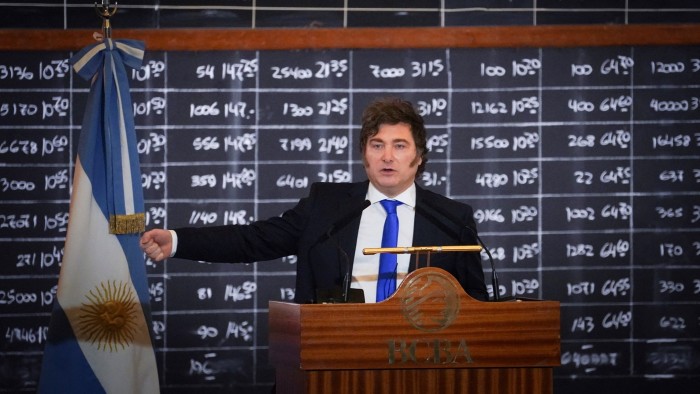Unlock the Editor’s Digest for free
Roula Khalaf, Editor of the FT, selects her favourite stories in this weekly newsletter.
It is winter in the southern hemisphere but Argentines are flocking to the beaches of Rio de Janeiro anyway, highlighting a problem for President Javier Milei and his crusade to make Argentina great again.
The caipirinha-sipping tourists are part of a bigger exodus. More than 8.4mn Argentines travelled abroad in the first four months of this year, 68 per cent more than in the same period the previous year. They are profiting from a peso so strong it has transformed once costly foreign trips into bargains — and blown a large hole in the country’s current account.
The potent peso is policy. Milei is betting it will help him achieve the goal on which he has staked his political reputation: killing inflation. Argentina holds midterm elections in October and although last month’s inflation was the lowest in five years, prices are still up 43 per cent year on year.
Faced with a dilemma between reducing inflation, boosting growth or building reserves and stabilising the exchange rate, “the government prioritised inflation, which is politically the most profitable, at the expense of the others,” said Eduardo Levy Yeyati, an economist and professor at Torcuato di Tella university in Buenos Aires. “Now the other areas are screaming for attention.”
With the peso about 40 per cent stronger against the dollar in real terms, imports have surged, small businesses are struggling and unemployment has jumped to a four-year high. Despite Milei’s oft-professed desire to transform statist Argentina into a beacon of free markets, chief executives are not opening their wallets. “The business class has never been so happy with a president but they are still not investing, outside energy and mining,” said one Argentine executive. “Until exchange controls are fully lifted and congress passes a labour reform, it’s very difficult to see that happening.”
Further damping animal spirits is a New York court judgment ordering the government to surrender its controlling stake in state oil company YPF to help settle a $16bn lawsuit over the company’s nationalisation in 2012. Milei has appealed against the decision.
His libertarian government has only a small minority of seats in congress and the midterms are crucial to bolster his position. The president is confident of victory, but Ramiro Blazquez, Latin America strategist at StoneX, says Milei lacks two crucial elements on the road to the vote: dollars and political consensus. Blazquez reckons that on a conservative estimate, the current account deficit will swell to $8bn in the third quarter as nervous Argentines indulge a favourite pastime: buying the US currency as a hedge ahead of elections.
The government’s desire to keep the peso strong has also kept it from buying dollars to build reserves, one of the goals it agreed with the IMF as part of a fresh $20bn bailout in April. Argentina will need dollars to make big foreign debt repayments next year to private creditors, a vital step towards returning to international capital markets.
Milei’s other problem is political. “The lack of consensus means that very dangerous laws are being discussed in congress, which could potentially wipe out the budget surplus,” Blazquez says.
In a taste of what may lie ahead, legislators in the Peronist-dominated Senate voted on July 10 to boost spending on pensions and social security, something the government says would cost about 2.5 per cent of GDP, when combined with other measures.
Milei has pledged to veto the bill and the government hopes that even if congress overrides his veto, legal challenges will prevent the extra spending from draining the budget before the election.
The consummate political outsider, Milei has never been a consensus-seeker but this mattered less over the past year because he secured the right to make certain reforms by decree, a faculty that has now expired. He was also able to bend provincial governors to his will by withholding funds, a strategy that is now reaching its limits.
Ahead of the midterms, it is his sister Karina, a former Instagram cake seller turned chief of staff, who has taken charge of political strategy.
There is still a world in which Milei triumphs at the elections, moves quickly to unwind the overvalued exchange rate and builds reserves, winning more investment. But, Argentina being Argentina, risks remain high.
The government is quick to fire a barrage of insults at anyone questioning its economic management, so few well-connected Argentines will risk public criticism. But, as one former senior official put it: “The economy looks fragile. In a country as dollarised as Argentina, you can’t afford the luxury of low reserves. I think the uncertainty is going to increase.”
